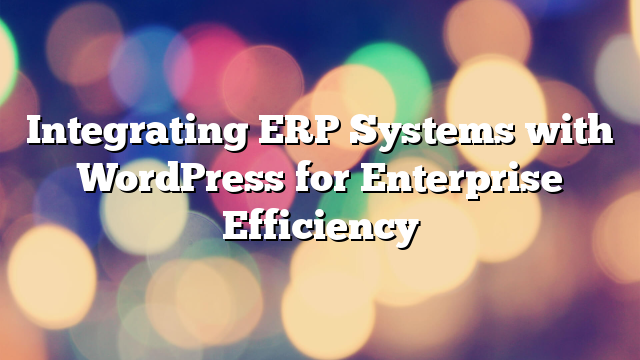Next.js and WordPress Integration: Enhancing Performance and User Experience
02.08.2024

In the realm of enterprise web development, delivering a seamless and high-performance user experience is paramount. Integrating Next.js with WordPress offers a powerful solution that combines the robust content management capabilities of WordPress with the dynamic, high-performance features of Next.js. At our enterprise web development services, we specialize in creating sophisticated web solutions that leverage the strengths of both platforms. This article explores how integrating Next.js with WordPress can enhance performance and user experience for enterprise applications.
Why Integrate Next.js with WordPress?
Next.js is a React framework that provides advanced features like server-side rendering (SSR) and static site generation (SSG). When combined with WordPress, it offers numerous benefits:
- Improved Performance: Next.js enables fast load times and smooth user experiences by rendering pages on the server or generating static pages ahead of time.
- Enhanced SEO: Server-side rendering improves SEO by ensuring search engines can easily index the content.
- Dynamic Content Delivery: Fetch content from WordPress via APIs and display it dynamically, ensuring users always see the latest information.
- Scalability: Easily scale both the frontend and backend to handle increased traffic and content.
Server-Side Rendering with Next.js
Server-side rendering (SSR) is a key feature of Next.js that enhances performance and SEO. By rendering pages on the server before sending them to the client, SSR ensures that users see fully rendered pages almost instantly. This is particularly beneficial for enterprise websites where performance and SEO are critical.
- Faster Load Times: Reduce the time it takes for users to see the content, improving engagement and user satisfaction.
- Better SEO: Improve search engine rankings by providing search engines with fully rendered HTML content.
- Dynamic Rendering: Fetch and render dynamic content from WordPress in real-time, ensuring users always have access to the latest information.
Static Site Generation with Next.js
Static Site Generation (SSG) is another powerful feature of Next.js that generates static HTML pages at build time. This approach combines the performance benefits of static sites with the flexibility of dynamic content.
- High Performance: Serve pre-rendered static pages that load quickly and efficiently.
- Security: Reduce the attack surface by serving static files instead of dynamic content.
- Scalability: Easily handle large amounts of traffic with minimal server resources.
API Integration: Connecting WordPress and Next.js
The integration between WordPress and Next.js is facilitated through APIs. By using REST APIs or GraphQL, developers can fetch content from WordPress and display it in Next.js applications seamlessly.
- Flexible Content Fetching: Retrieve specific data from WordPress as needed, optimizing performance and reducing load times.
- Real-Time Updates: Ensure users see the most up-to-date content by fetching data from WordPress in real-time.
- Complex Queries: Use GraphQL to fetch related data in a single request, simplifying data management and enhancing performance.
Enhancing User Experience with Next.js and WordPress
Integrating Next.js with WordPress not only improves performance but also enhances the overall user experience. Here’s how:
- Responsive Design: Build responsive and interactive user interfaces that adapt to different devices and screen sizes.
- Smooth Navigation: Ensure smooth and fast navigation between pages, improving user engagement and satisfaction.
- Rich Content Delivery: Display rich and dynamic content from WordPress, providing users with an engaging experience.
Real-World Applications of Next.js and WordPress Integration
Enterprises across various industries can benefit from integrating Next.js with WordPress. Some common use cases include:
- E-Commerce Platforms: Build fast, SEO-friendly online stores with dynamic product listings and seamless checkout experiences.
- Corporate Websites: Develop high-performance corporate sites that offer rich user experiences and support complex content management needs.
- Content-Heavy Websites: Manage and deliver large volumes of content efficiently, ideal for media and publishing platforms.
- Web Applications: Create interactive web applications with real-time data fetching and dynamic content delivery.
Conclusion: Elevating Enterprise Web Development
Integrating Next.js with WordPress offers a powerful solution for enterprises looking to enhance performance and user experience. At our enterprise web development services, we specialize in creating tailored web solutions that leverage the strengths of both platforms. Whether you need to improve the performance of your current site or develop a new application, our expertise ensures your project meets the highest standards of excellence. Contact us today to learn how we can help you harness the power of Next.js and WordPress for your enterprise web development needs.



